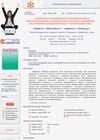 November 2023 in “Curēus”
November 2023 in “Curēus” Melatonin may help manage PCOS by improving insulin sensitivity, hormone balance, and mood.
May 2012 in “Hair transplant forum international” Inflammation and immune responses contribute to female pattern hair loss.
58 citations,
February 2018 in “Journal of cosmetic dermatology” Estrogen helps keep skin healthy and may make women look younger and more attractive.
 May 2024 in “International Journal of Advanced Academic Studies”
May 2024 in “International Journal of Advanced Academic Studies” Vitamin E helps reduce PCOS symptoms and improves hormonal balance.
 3 citations,
April 2015 in “American journal of biomedical sciences”
3 citations,
April 2015 in “American journal of biomedical sciences” Androgens play a key role in hair growth and disorders like baldness and excessive hairiness.
January 2019 in “Springer eBooks” Sebaceous glands play a key role in skin health and conditions like acne.
 1 citations,
January 2022
1 citations,
January 2022 Myo-inositol and D-chiro-inositol improve hormonal and physical symptoms in teenage girls with PCOS.
 December 2024 in “International Journal of Advanced Research”
December 2024 in “International Journal of Advanced Research” Metformin and vitamin D3 help manage insulin resistance and hormonal imbalances in obese PCOS patients.
 47 citations,
December 2000 in “Archives of Dermatological Research”
47 citations,
December 2000 in “Archives of Dermatological Research” Androgens significantly affect female hair loss, and hormonal treatments may help.
 2 citations,
January 2015 in “Springer eBooks”
2 citations,
January 2015 in “Springer eBooks” Environmental factors and exposure to toxins may contribute to male infertility by affecting sperm and hormone function.
 65 citations,
May 2010 in “Current Women's Health Reviews”
65 citations,
May 2010 in “Current Women's Health Reviews” Oxidative stress is a key factor in the development of Polycystic Ovary Syndrome, and weight management can improve symptoms.
 6 citations,
October 2007 in “Medical Hypotheses”
6 citations,
October 2007 in “Medical Hypotheses” Male pattern baldness might have evolved to help protect against prostate cancer by increasing UV radiation on the scalp.
August 2018 in “Ayurline: IJ-RIM” Diet and lifestyle changes can help manage hair loss in alopecia.
 86 citations,
May 2013 in “American journal of obstetrics and gynecology”
86 citations,
May 2013 in “American journal of obstetrics and gynecology” Gynecologists should provide comprehensive care for transgender patients, including mental health evaluation, hormone therapy, and surgical options, while monitoring for side effects and ensuring patient safety.
 November 2011 in “Informa Healthcare eBooks”
November 2011 in “Informa Healthcare eBooks” Environmental, chemical, mechanical, and personal health factors can all damage hair and contribute to hair loss or changes in hair quality.
3 citations,
June 2017 in “Reproductive biomedicine online” A certain mutation in the fetal alpha 5-reductase gene is linked to a higher risk of late miscarriage.
25 citations,
June 2017 in “Journal of steroid biochemistry and molecular biology/The Journal of steroid biochemistry and molecular biology” VDR regulation varies by tissue and is crucial for its biological functions.
 May 2017 in “bioRxiv (Cold Spring Harbor Laboratory)”
May 2017 in “bioRxiv (Cold Spring Harbor Laboratory)” The peach gene pCTG134 helps control the interaction between auxin and ethylene hormones during fruit ripening.
 July 2021 in “International Journal of Homoeopathic Sciences”
July 2021 in “International Journal of Homoeopathic Sciences” Certain factors can trigger hormonal imbalances and cyst formation, leading to Polycystic Ovarian Syndrome (PCOS).
 60 citations,
October 2014 in “Journal of the American Academy of Dermatology”
60 citations,
October 2014 in “Journal of the American Academy of Dermatology” Dermatologists play a key role in treating skin symptoms of PCOS like dark patches, excess hair, acne, and hair loss.
 7 citations,
January 2013 in “European Urology”
7 citations,
January 2013 in “European Urology” 5-Alpha reductase inhibitors may prevent prostate cancer but are not widely used due to concerns about trial relevance and potential risks, and more research is needed to confirm long-term benefits.
 26 citations,
May 2012 in “Cellular and Molecular Life Sciences”
26 citations,
May 2012 in “Cellular and Molecular Life Sciences” NcoA4 may have roles beyond helping control gene activity, possibly affecting cell behavior and stability.
149 citations,
January 2011 in “Nature reviews. Urology” Hormonal interactions, especially involving DHT and estrogen, play a key role in BPH development and treatment.
 8 citations,
June 2016 in “Journal of Cosmetic Dermatology”
8 citations,
June 2016 in “Journal of Cosmetic Dermatology” Women with persistent acne and high levels of antimullerian hormone are more likely to have polycystic ovarian syndrome.
 April 2024 in “Remedium Journal about the Russian market of medicines and medical equipment”
April 2024 in “Remedium Journal about the Russian market of medicines and medical equipment” Pharmacy workers need more education to better help people with hair loss.
 9 citations,
August 2014 in “Journal of The American Academy of Dermatology”
9 citations,
August 2014 in “Journal of The American Academy of Dermatology” Hormonal imbalances may play a role in frontal fibrosing alopecia, and antiandrogenic drugs combined with steroids are currently the most effective treatment.
 5 citations,
March 2014 in “Journal of The American Academy of Dermatology”
5 citations,
March 2014 in “Journal of The American Academy of Dermatology” The study suggests hormonal factors may play a role in Frontal Fibrosing Alopecia and that treatments like oral antiandrogens and steroids could be beneficial.
 1 citations,
January 2020 in “Инфекционные болезни. Новости, мнения, обучение”
1 citations,
January 2020 in “Инфекционные болезни. Новости, мнения, обучение” Lack of vitamin D might cause hair loss due to autoimmune problems, and fixing vitamin D levels could help treat it.
 16 citations,
July 2012 in “Current pharmaceutical biotechnology”
16 citations,
July 2012 in “Current pharmaceutical biotechnology” New treatments for skin conditions related to the sebaceous gland are being developed based on current research.
 29 citations,
July 2009 in “BJU international”
29 citations,
July 2009 in “BJU international” Blocking DHT production more strongly may help control advanced prostate cancer and improve quality of life.























